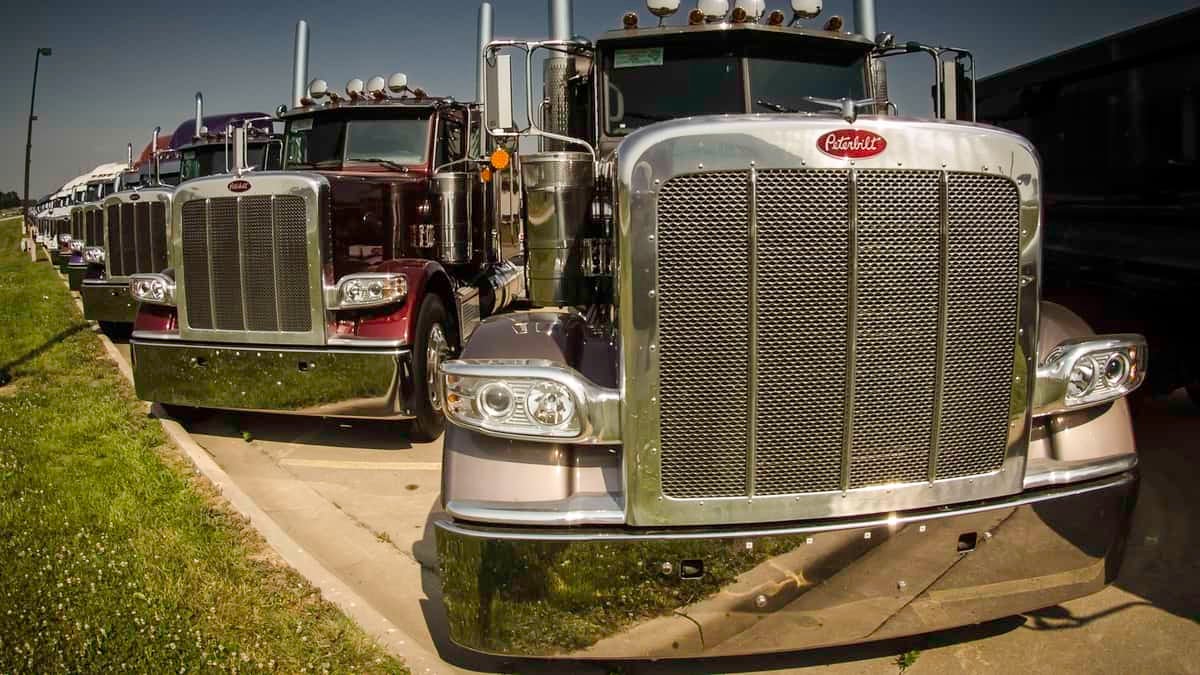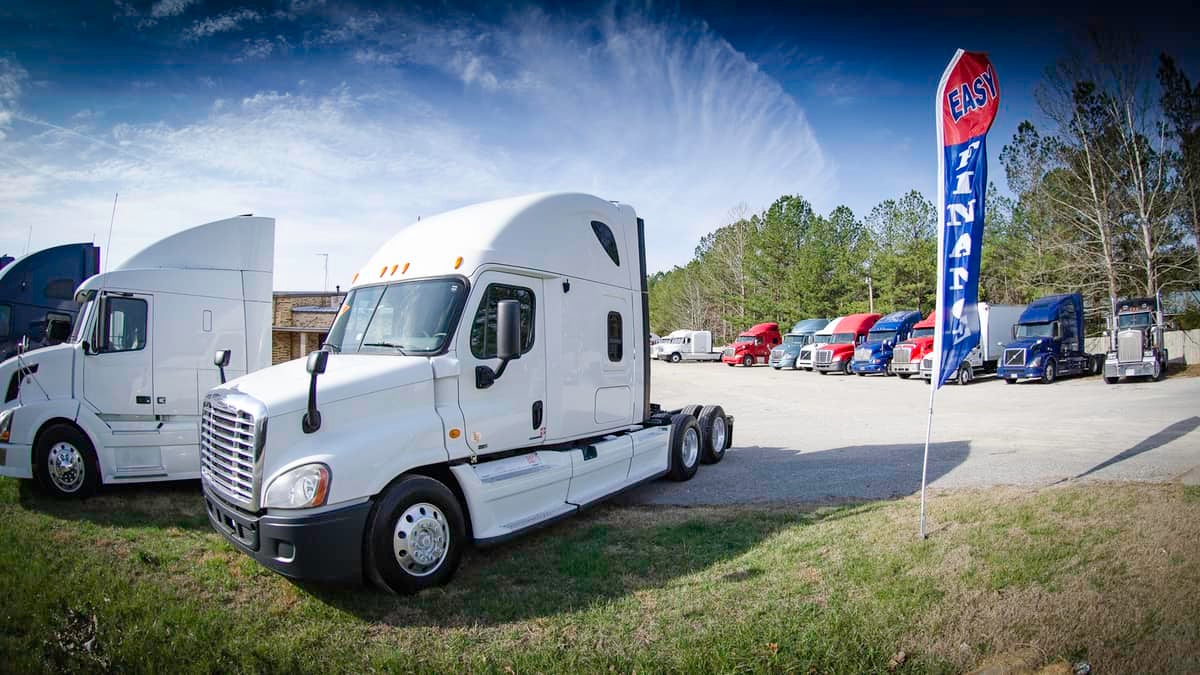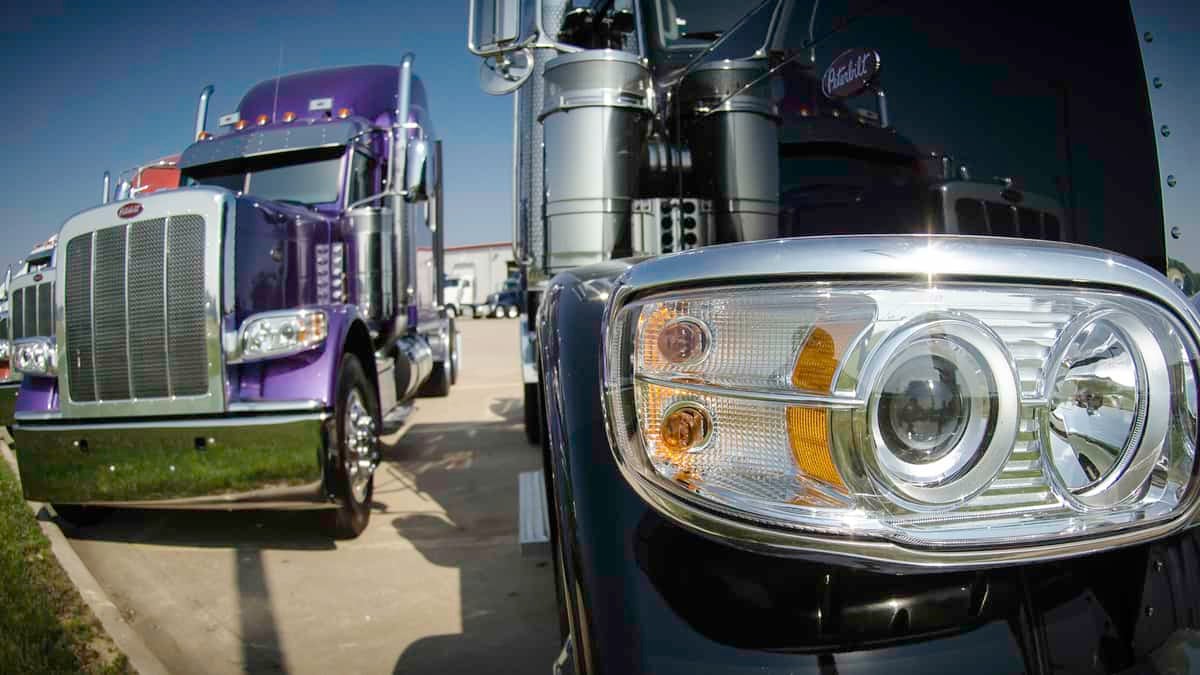Deciding to purchase a Class 8 truck is a large and serious investment. Truck drivers often dream about the day they drive their very own Class 8 vehicle off the lot. However, these commercial machines are not cheap nor is it an easy task to keep up.
Whether you are planning to start or expand your fleet, here are 10 things to consider before buying your next Class 8 truck:
1. Determine budget for initial cost.
Prices for Class 8 trucks vary depending on manufacturer, model, year, size, and many other variables. However, according to Ask The Trucker, different dealers could have vastly different prices on identical trucks. This is why it is very important to determine your budget (or range of budget) prior to anything else in the process of finding your truck.
Ask The Trucker estimates that one should expect to pay over $100,000 for your first commercial vehicle. “On average, a brand-new day cab costs about $113,00 and a sleeper will set you back $125,000.” This price estimate does not include the price of the trailer; new trailers will typically add an extra $50,000 for a typical rig. (Ask The Trucker)
While these numbers are already high, this is only the initial cost of your Class 8 truck, and according to Truckied.com, the purchase price of a truck is just a fraction of the overall costs of owning one of these commercial vehicles.
2. Research all buying options – new vs. used
One of the first decisions that needs to be made in purchasing a truck is whether it will be bought new or used.
If you are purchasing a new truck, mylittlesalesman.com recommended investigating different brands of semi-trucks on the market in order to learn about both the reputation and quality of the manufacturer and the specific model. It is also important to research engine options and look for one that is capable of going well over one million miles. The engine should be able to go at least 700,000 miles before showing problems, according to mylittlesalesman.com.
To provide an estimated cost for used trucks; “the best-kept used semi-trucks for sale can be $100,000,” stated mylittlesalesman.com. “A seven-year old semi-truck can cost between $30,000 and $40,000, and semi-trucks that are 10 years or older cost substantially less.”
If considering the purchase of a used commercial vehicle, it is highly recommended by Commercial Carrier Journal to research a truck’s maintenance documentation. If the used truck you’re looking at does not include any documentation of previous maintenance work, it is a big risk and according to mylittlesalesmen.com, smart business owners won’t take that risk. The most reputable sellers of Class 8 trucks will have up-to-date records with information on previous maintenance, accidents, upgrades and even oil changes. (mylittlesalesmen.com) Not only is this important in understanding the value of the vehicle you are considering, it also gives you an idea of what parts may need attention or replacement in the future.
“It’s up to you to do the homework. Do your research before you buy. Afterall, you will be the one stuck with the consequences of a bad purchase.” – smarttrucking.com
3. The “where” and the “what”
“To do the best you can, you need to match the specific truck to the work you are going to do with it,” stated The Truckers Report.
The next decision in the process of purchasing your Class 8 truck involves the features and capabilities that different models have to offer. Start by identifying all the tasks that this potential truck will take on. How far does it need to travel? What kind of terrain will it be on? What kind of loads will it carry? These questions will help identify how many axles the truck will need as well as what kind of horsepower and capacity is necessary to fit the job.
Different Class 8 trucks are built for different types of jobs. The engine, transmission, gearing, axle capacities, and more pieces that make up the kind of truck you are looking for must be paid careful attention to in the process of purchasing.
The more axles one adds to a truck, the more weight it will be able to transport. However, with multiple axles, the steering becomes more difficult and the price tag is much higher, according to mylittlesalesman.com.
Another element to consider is the terrain you will be driving the truck on. “The flat lands of southern Illinois require a different power and gearing combo than the hills of eastern Pennsylvania. To pull a Michigan train at 160,000 pounds gross is a different thing from pulling 8,000 pounds of styrofoam on a flatbed” (The Truckers Report). Once it is determined the kind of road your truck will travel, it is recommended by The Truckers Report that you do your research on the truck that best fits your needs.
“Identify your horsepower needs and capacity and when inquiring about a truck, be sure to specifically seek information about the truck’s capacity and if it will meet your own towing requirements.” (Truck and Trailer Empire)

4. How much will a Class 8 really cost?
As mentioned before, the initial price is only a fraction of the total cost of owning a commercial vehicle. Askthetrucker.com estimates that a big rig costs nearly $180,000 to operate for a single year – or $1.38 per mile on the road – which does not even include the initial price for the truck.
When budgeting for and purchasing your Class 8 truck, you need to consider the cost of repair, maintenance, insurance, licenses, permits, tolls, and most of all, fuel. Fuel, according to askthetrucker.com, is the largest operating cost for drivers, costing easily more than $70,000 annually.
When it comes to budgeting for repairs, The Truckers Report suggests to budget for an overhaul within the first year of running a used truck purchased with over 600,000 miles on it. After the engine has reached 750,000 miles, it is suggested that the owner budget enough money to rebuild the engine tomorrow if need be. “Many engines last well over 1 million miles,” stated The Truckers Report, “but you have to have a budget set for whatever mechanical emergencies that can happen.”
5. Steps & qualifications for truck financing
As you continue to research information regarding your future truck, one thing you might need to look into is financing options. When it comes to providing financing, there are many different lenders and they have different qualifications or plans. This is something you should thoroughly research in advance.
Often times you must have a credit score above 600, a down payment of at least 5 percent or more, no repossessions and a minimum of five years with a commercial driver’s license in order to qualify for up to $75,000 in low-rate equipment (Smarter Finance USA).
Six steps for for commercial truck financing, recommended by Fitzbitzloans:
- Show proper proof of business
- Get personal credit as high as possible
- Find a truck in good condition to lease
- Save enough money for a downpayment and cash reserves
- Obtain truck insurance
- Find a good financing company
6. Source replacement parts
Truck and Trailer Empire puts a heavy emphasis on finding at least two parts suppliers that are able to provide replacement parts for your particular model of truck. This is one major reason why it is recommended, for practical purposes, to avoid any limited edition models or lesser-known brands. It may be very difficult to find the required parts – even those that seem unimportant.
“If you cannot get the parts you need, then your truck is rendered useless,” stated Truck and Trailer Empire.

7. Budget for maintenance
“A driver’s worst nightmare is seeing smoke”
Askthetrucker.com
Regular maintenance, as stated by askthetrucker.com, adds up to be roughly $15,000 each year. For that reason, it is highly recommended that when shopping for a truck, one should budget the potential maintenance that it will require.
Truck and Trailer Empire put it this way: “You want to tally up your total estimated cost for potential repairs/upgrades. Take this additional cost and factor this into your overall investment so that you can determine the complete picture of your budget.” By budgeting these costs from the very beginning, you can avoid being unprepared for any additional expenses that may occur.
8. Research insurance options
Shopping for the right truck is time consuming, but you cannot forget to shop for the right insurance as well. Monthly rates for trucker’s insurance vary depending on the provider (and your driving record), so it is worth your time to shop around to see all of the available options. Truck and Trailer Empire suggests not only to consider cost but to consider the “best possible coverage available that will support you should you suffer a loss to your business.”
With all of the major expenses involved in purchasing a Class 8 truck, truck insurance can be “surprisingly affordable,” according to askthetrucker.com. For as low as $6,500 yearly, you can protect your truck and your clients’ products from harm (askthetrucker.com).
9. Talk to an expert.
If you are unsure about any of the decisions involved in picking your truck out, it is always smart to reach out to someone who knows all about trucks – both used and new. If you reach out to an expert, he/she should be able to not only answer any questions you may have, but also point things out that you might have overlooked. According to Truck and Trailer Empire, it is always a good idea to get an expert involved if it means ensuring a longer lifespan for your truck or a better bang for your buck.
10. Know your seller
“Finding a vendor you can trust is crucial to securing a reliable, affordable price on the truck you need.”
askthetrucker.com
Once you have come up with the best truck for your needs, the last step is finding a dealer that you trust. Smarttrucking.com says that “unless you know the original owner and maintenance history, it is recommended that you deal with a reputable used truck dealer, rather than a private individual” for many reasons.
First, with reputable dealers, various options of financing are typically available. Second, according to smarttrucking.com, there is a better chance of recourse if the deal goes south because most dealers will avoid any chance of ruining their reputation. And lastly, with many dealerships, a short warranty is offered in case something breaks after the purchase.
Finding the right truck for your money can be a challenge. With all of the options to consider, it is well worth all of the research and time poured into finding the right vehicle for the right price.









Dennis Sanchez
I thought it was interesting when you mentioned that when purchasing a semi-truck, it is important to find at least two suppliers that can provide you with parts when needed. If I were to guess, not every supplier will have parts for every type of truck. This information you shared would be very helpful to anyone who is considering becoming a commercial freight driver.